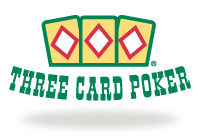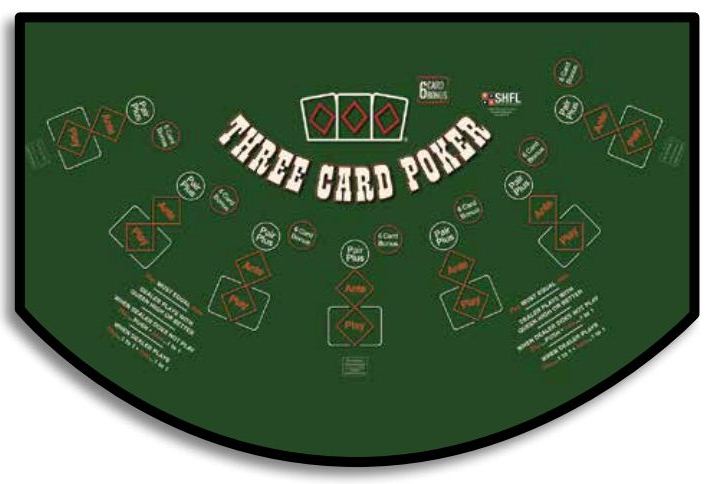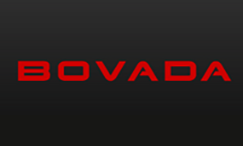
A hybrid table game popularized in 1994, Three Card Poker incorporates elements of poker and blackjack to form an exciting, fast paced contest between players and a house dealer.
The mechanics of Three Card Poker are simple and easy to pick up for anybody who has ever dabbled in either poker or blackjack. With two tiers of betting – the main ante and play bets along with the Pair Plus and other bonuses – Three Card Poker offers multiple forms of action on every hand. Even better, the big bonus payouts awarded for qualifying high hands like three of a kind or a straight flush can turn a casual game into an unforgettable score.
Every experienced gambler has that friend who winds up winning big on their first trip to Las Vegas or the local casino. And more often than not, those stories usually take place at a Three Card Poker table, where a few small side bets on the bonus and three perfect cards can combine for huge payouts.
Top Casinos
Three Card Poker Basics
The first action in a Three Card Poker hand is a mandatory bet known as the Ante. This wager must be made for a player to take a hand. After making the ante bet (along with the Pair Plus and other side bets, which will be explained below) players receive three cards, as does the dealer. The player’s cards may be exposed at this point, but the dealer’s hand remains face down.
Three Card Poker relies on the traditional poker hand hierarchy to determine winners, but rather than five cards only three are needed. This means high-card (A-3-2) is the lowest qualifying hand, followed by one pair (9-9-2), flush (any three cards of the same suit), straight (6-7-8), three of a kind (9-9-9), straight flush (6-7-8 of the same suit), and in some casinos, the mini-Royal (A-K-Q of the same suit).
Remember, in traditional five card poker a flush beats a straight because the hand is slightly easier to make, and both hands beat three of a kind for the same reason. But things change in Three Card Poker, and the hand values are turned upside down.
With 52 combinations available to make three of a kind, this hand is actually nearly as difficult to make as a straight flush (48 combinations). The odds of making either hand stand at less than 1 percent, while a straight (3.2 percent) and flush (4.9 percent) are far easier to make.
Based on the strength of your hand, you can decide whether to match your Ante with an equal Play bet. If you have a weak hand and decline to play, you can fold and forfeit your ante and bonus bets. When you decide to post the Play bet the dealer will then expose their cards to determine a winner.
The dealer hand must be queen-high or better to qualify. When the dealer fails to produce a qualifying hand, your Ante bet is paid out at even money, while the Play bet is automatically returned as a push. When the dealer produces a qualifying hand it’s compared to each player hand and the highest hand is declared the winner. If your hand is better than the dealer’s, both your Ante and Play bets will be paid out at even money. Identical hands are deemed a push.
The game’s flair comes from the bonuses of course, and even if you don’t wager on the Pair Plus bonus, you can still enjoy a little extra juice on your money from time to time. Whenever a player hand makes a straight or better, it qualifies for an Ante Bonus, or an additional payout on top of the even money you get on the Ante and Play bets.
To top it off, even if the dealer somehow produces a superior hand, causing you to lose the Ante and Play bets, you recoup some of those losses because the Ante Bonus is awarded no matter what when you make a straight or better. There are a few Ante Bonus payout tables out there, but for the most part you’ll see 1 to 1 payouts on straights, 4 to 1 on flushes, and 5 to 1 on straight flushes. The house edge on this standard 5-4-1 pay table is 3.37 percent.

Bonus Side Bets in Three Card Poker
The other primary bet you can make in Three Card Poker is known as the Pair Plus bet. This can be anywhere from $1 on up, and making the bet entitles you to a sizable extra payout when you happen to make big hands.
The name Pair Plus comes from the fact that you need at least a pair to qualify, and while this pays out at even money, the real excitement comes from hitting a straight flush and its 40 to 1 payout. Three of a kind hands also pay out pretty nicely at 30 to 1, and many players enjoy grinding Three Card Poker with the express intent of spiking a big hand with a Pair Plus bet on the line.
The standard pay table used for Pair Plus bonus bets (40-30-6-4-1) offers a 2.32 percent house edge, but alternative Pair Plus pay tables like the 40-30-6-3-1 can be deceptive, while also increasing the house edge to 7.28 percent.
In some cases you’ll find Three Card Poker tables that include the mini-Royal (A-K-Q of the same suit) on the Pair Plus pay table, and these pay out at 80 to one. The standard Pair Plus pay table with mini-Royals included (80-40-25-6-3-1) offers a 7.73 percent house edge.
Additionally, many casinos offer tables featuring progressive bonuses that pay out escalating jackpots that can run into the six- and even seven-figures. In order to hit these jackpots, players must make the additional side wager and make specific high hand; usually a mini-Royal in spades.
Finally, you may notice Three Card Poker tables advertising a Six Card Bonus, and this simply refers to the practice of combining your three cards with the dealer’s three cards, while making the best five-card poker hand possible. Five-card Royal Flushes trigger the jackpot on this special bonus bet.
The Strategy of Three Card Poker
Optimal strategy for Three Card Poker can be distilled into the simplest of formulas: when your hand strength equals queen-six-four or higher, you should always post the additional Play bet. When your hand strength equals anything lower than queen-six-four, you should fold and surrender your Ante and bonus bets. The reason for this is based on mathematical certainty, as queen-six-four represents the minimum hand you need to rate better than the dealer’s random three cards.
One thing about Three Card Poker to keep in mind is that your hand will beat the dealer’s hand 44.91 percent of the time, you’ll lose 55.03 percent of the time, and the rest of the hands will result in a chop. But by sticking to the queen-six-three threshold for matching the Ante bet, you’ll stand to lose 8.26 percent of your Ante bet, but your win rate on the Play bet will jump to 5.29 percent.
Some players advocate a strategy based on replicating the dealer’s action, or in other words, raising on any hand queen-high or better. Gambling experts have determined that this is a serviceable strategy overall, lowering the house edge to 3.45 percent as opposed to 7.65 percent when playing by instinct alone. Overall though, the queen-six-four strategy lowers the house edge more than any other, and using this as a minimum hand with which to raise will save you money over the long run.






